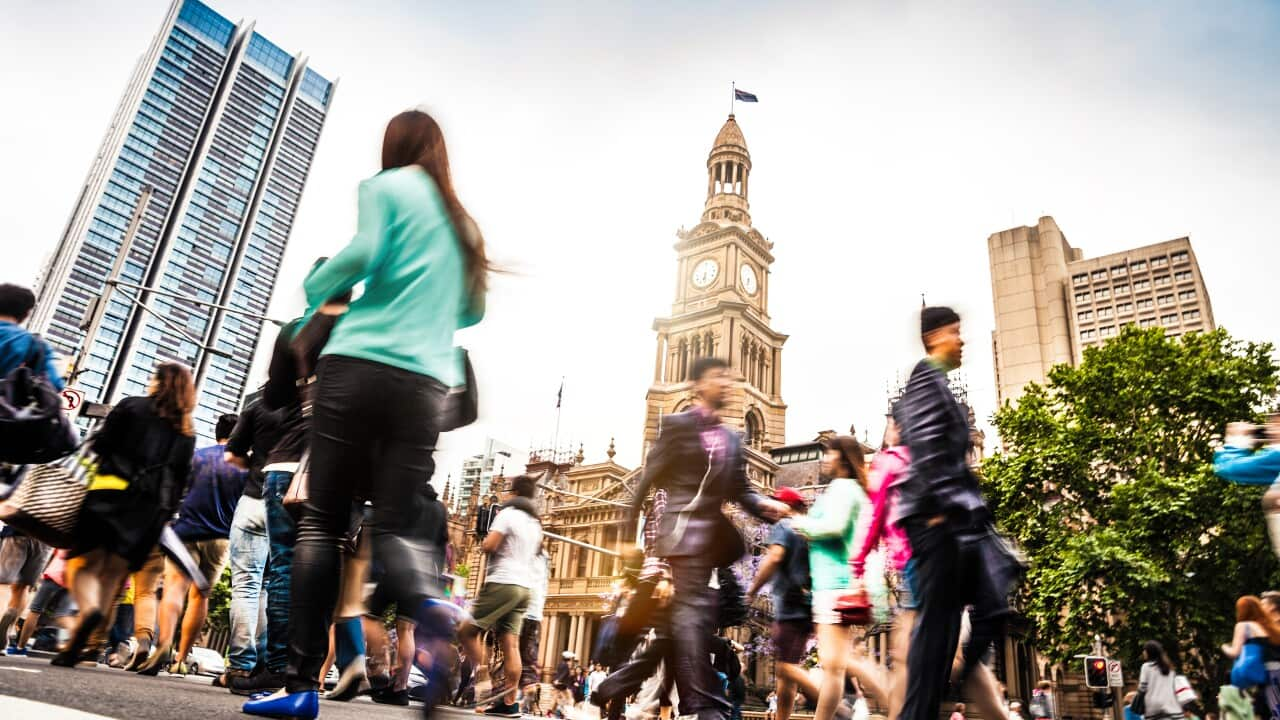Listen to Australian and world news, and follow trending topics with SBS News Podcasts.
TRANSCRIPT:
Australia's hold on social cohesion may be changing with declines reported on several fronts.
The Scanlon Foundation Research Institute’s annual Mapping Social Cohesion Report reveals that economic pressures and inequality are the most significant issues affecting Australians today.
Dr James O'Donnell from the Australian National University is the author of this year's report.
"Social cohesion as measured as a really sort of multi-dimensional construct, taking into account, a sense of belonging in Australia in our local communities, a sense of trust in other people and in governments, the extent to which we will feel happy and financially secure, the extent to which we're engaged in our communities and participate and volunteer and the extent to which we are accepting of people from other and different backgrounds. Social cohesion has been declining on several different dimensions. So, we're reporting that we feel a weaker sense of belonging in Australia, we are more likely to be experiencing financial stress, we are more concerned about economic inequality and we are less trusting of government."
The 2023 survey collected the views of 7,500 respondents with over 90 questions asked on topics including immigration, multiculturalism, major issues facing Australia, government and community life.
The 2020 survey revealed a strong surge across multiple social cohesiveness indicators during the COVID 19 pandemic, but the current data shows these are wearing off.
Fifty-two percent of people in 2020 reported feeling a great sense of belonging in Australia but that figure has declined to a record low of 48 per cent in 2023.
The proportion of people who take great pride in the Australian way of life and culture has declined to 37 percent.
A record-high 84 per cent of people believe the gap between those with high and low incomes is now too large.
Chair of the Federation of Ethnic Communities Councils of Australia Carlo Carli says heated and politically sensitive debates on local and international matters as well as recent financial pressures have hindered social cohesion in the country.
"Social cohesion is an area which Australia has invested a lot of effort and its whole multicultural project is about improving social cohesion. It does fluctuate at times. And I think at the moment we've got a number of stresses on our social cohesion. We've had a very difficult debate around the referendum on the voice to Parliament. We have had a drop in the finances of Australian households in a very dramatic drop because it's everything from high inflation to low wage increases to high interest rates. And finally, we have the conflict in the Middle East which is also creating difficulties."
Despite economic concerns, respondents remain enthusiastic about cultural diversity - with 89 per cent of Australians agreeing that multiculturalism has been good for Australia, while 86 per cent agree that immigrants are good for Australia’s economy.
It also shows that, 80 percent feel they belong in their neighbourhood and 64 per cent say that their neighbourhood has a strong sense of community.
However these perceptions differ depending on who you speak to and what's happening politically in Australian and internationally.
Jewish and Muslim communities a case in point.
Since the start of the Israel-Hamas war in Gaza on October 7, police have recorded an increased number of anti-Muslim and antisemitic incidents.
Dvir Abramovich is the Chair of the Anti-Defamation Commission in Australia.
He says rate of antisemitism has heightened since the start of the war.
"Many of us are feeling under siege and on edge because we are seeing people who we thought were friends and allies actually turning their back on us walking away. Because when you have young Jewish students at schools being called bombers surrounded and accused of being baby killers, when you have people on the street being verbally abused when you have Jewish businesses boycotted, it is alarming. The Jewish community is always a full participant in Australian society and has worked hard to nurture tolerance and cohesion and harmony, we do feel that this is a real threat. "
Kamalle Dabboussy, Chief Executive of the Australian Federation of Islamic Councils, says the heat of the conflict in the Middle East is being felt by all parties.
"We need to recognise that there are Islamophobic attacks that are happening. And there are an increase of Islamophobic attacks that are taking place, I think a tenfold increase. Certainly where I'm at here and in the city of Sydney, our centre has received an increase of hate calls. We've chosen not to publicise them too much because we're not wanting to make increase concerns within the community."
While support for multiculturalism and immigration has remained high over the last decade, discrimination and prejudice remains common in 2023.
Eighteen per cent of people said they experienced discrimination in the last 12 months because of their skin colour, ethnic origin or religion - that's up up from 16 per cent in 2022.
Chief executive of Multicultural Australia Christine Castley believes that navigating through the pressures faced in the wake of the COVID -19 pandemic has influenced the public's perception of a cohesive Australia.
"So, what we really need to do as a country I think is work on building that resilience, work on those strengths that we all need to have in terms of being able to reach out, connect, communicate with each other. Learn how to straddle differences and learn how to come together with our different histories and stories and experiences. There's a real piece here for us, and an opportunity for us to create true belonging in Australia."
With financial pressures heightened, the proportion of people who are satisfied with their finances dropped to 61 per cent in 2023 - down from 64 per cent last year.
Twelve per cent of respondents in 2023 reported that they often or sometimes went without food, and 22 per cent often or sometimes could not pay for medicines or health care.
Dr James O'Donnell says it's important these issues are addressed.
"The first is obviously around helping households, help in their finances and ensuring that people are able to make ends meet. When they can't make ends meet or when they are really struggling, they have a much lower sense of belonging and trust in Australia. They are much less accepting of our diversity and our differences, and its that strain of financial pressure that is really important to address or at least sort of manage through this next little period."
The view that Australia is “a land of opportunity” is slowly deteriorating.
Sixty-three 63 per cent agreed with this notion in 2023 – 16 percentage points less than a decade ago.













